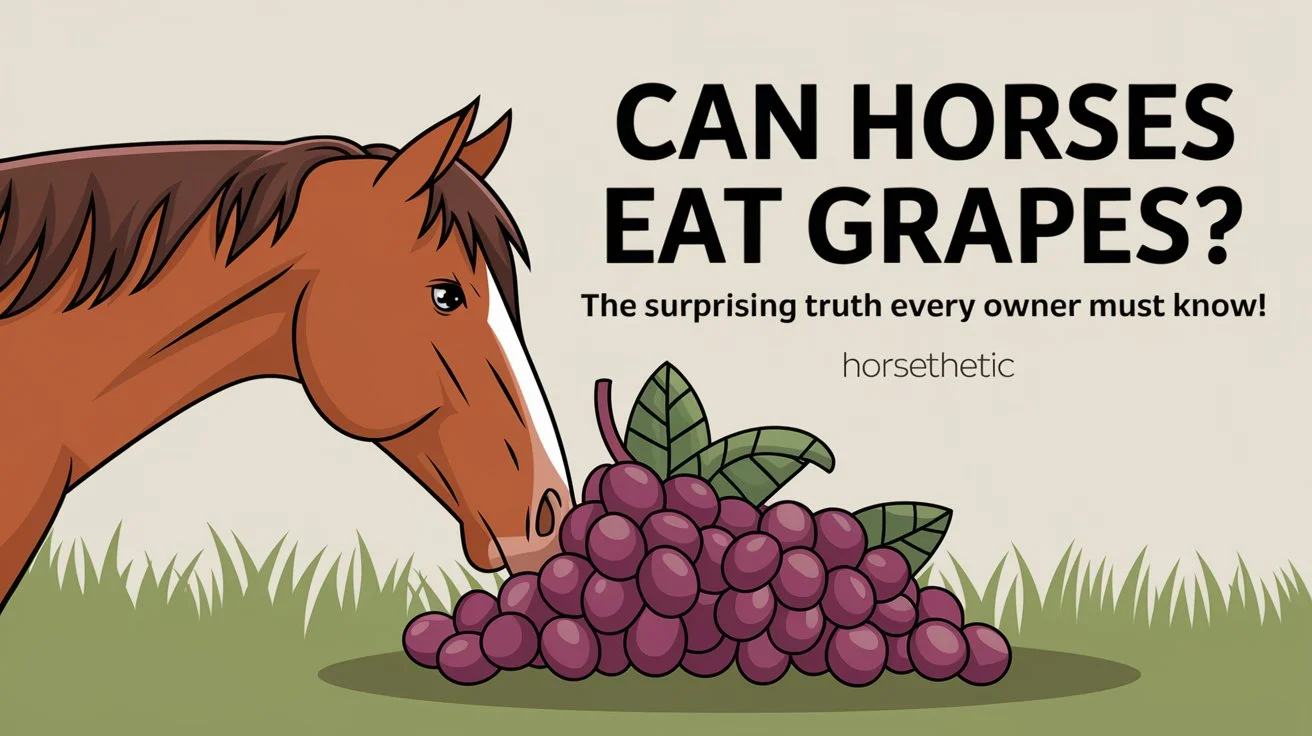Horses may be curious about new foods, but not everything is safe for them. While grapes are not toxic, they can pose serious health risks if overfed. Horse owners often enjoy spoiling their animals with sweet treats like apples and carrots, but moderation is key with grapes to avoid grape poisoning and ensure a balanced diet.
Nutritional Value of Grapes for Horses: Content & Benefits
Grapes can be a delightful treat for horses, but it’s essential to understand their nutritional value. These healthy treats offer a range of benefits that can support your horse’s well-being, especially when given in moderation.
Grapes are packed with essential vitamins and minerals, making them a valuable addition to a horse’s diet. Here’s what makes grapes beneficial:
- Carbs: 18 g
- Dietary fibre: 0.9 g
- Fat: 0.16 g
- Protein: 0.72 g
- Sugar: 15.48 g
Benefits of Grapes for Horses
- Hydration: With a high water content (82%), grapes provide extra hydration to your horse.
- Energy Boost: The natural sugar content offers a quick energy boost, beneficial during training or for daily activities in the pasture.
- Digestive Health: The dietary fibre in grapes aids in maintaining a healthy digestive system and supports gut health.
- Immune System Support: Vitamin C and antioxidants in grapes help in boosting the horse’s immune system and overall health.
- Antioxidant Properties: Resveratrol and flavonoids reduce inflammation and help in cleansing the body of toxins.
Vitamin Benefit
Vitamin A Supports vision and skin health
Vitamin C Acts as an antioxidant and aids in healing
Vitamin K Supports bone health
Potassium Enhances muscle function and heart health
Magnesium Contributes to energy production and bone health
Feel free to integrate grapes into your horse’s diet for these benefits, always remembering to do so in moderation to maintain a balanced diet.
How Many Grapes Can Horses Safely Eat? Guidelines for Moderation
Feeding horses grapes can be a sweet treat and provide nutrition, but it’s crucial to do so in moderation.
To ensure safe consumption, introduce grapes gradually and monitor for any adverse reactions.
Here are some key guidelines for feeding grapes to your horse:
- Serving Size: Stick to 2-3 seedless grapes at a time to avoid choking and manage the sugar content.
- Slice Grapes: Always slice grapes before feeding to reduce the choking risk and ensure they are pesticide-free.
- Gradual Introduction: Start with a small amount and observe your horse for any digestive upset or changes in behavior.
- Consult a Professional: If your horse has a history of choke, colic, laminitis, or kidney issues, consult a veterinarian to ensure grapes fit within their dietary needs.
Following these guidelines helps balance treats with your horse’s daily caloric intake and supports their overall health and physical well-being.

The Dangers of Grapes for Horses: What You Need to Know
Grapes might seem like a delicious snack, but they pose devastating risks to horses due to the toxic substance resveratrol found in the skin and seeds. Even a small amount of grape residue or juice can lead to kidney failure and other severe health problems.
Risks of Grapes for Horses
Kidney Failure:
Ingesting grapes can lead to kidney failure, as the toxic substance resveratrol affects the cells that filter waste from the bloodstream, leading to a loss of kidney function.
Gastrointestinal Upset:
Horses may experience nausea, vomiting, and diarrhea as their bodies try to rid themselves of the toxic substance. These symptoms indicate that the gastrointestinal system is struggling to handle the toxins.
Colic:
Severe cases of grape poisoning can result in colic, a painful condition that causes abdominal discomfort. If left untreated, this can lead to fatal organ failure.
Neurological Issues:
Toxic compounds in grape vines and leaves can cause neurological problems like tremors or even death if ingested by horses in pasture.
Obesity and Laminitis:
The sugar content in grapes contributes to weight gain and can exacerbate conditions like laminitis and insulin resistance over time, making them a dangerous treat for horses.
Safe and Unsafe Fruits for Horses: A Complete Guide
Grapes, for instance, are notoriously toxic and can lead to severe health issues, including kidney failure. On the flip side, there are fruits that not only add variety but also provide essential nutrients to your horse’s diet. It’s essential to know which fruits are safe and which should be avoided to ensure the well-being of your horse.
Safe Fruits for Horses:
- Apples: A favorite rich in fiber and vitamins A and C.
- Bananas: Packed with potassium and a sweet treat; best in smaller pieces.
- Berries: High in antioxidants and easy to feed without much cutting.
- Watermelon: Hydrating and rich in vitamins A, B6, and C; including the rind adds extra benefits.
- Carrots: Sweet and nutritious, high in beta-carotene and fiber.
- Pears: Offer vitamins C and K; ensure they are cut into appropriate sizes to avoid choking.
Unsafe Fruits for Horses:
- Chocolate: Contains theobromine, which can cause increased heart rate, muscle tremors, and seizures.
- Onions and Garlic: Lead to anemia and damage red blood cells, causing Heinz body anemia.
- Avocado: Contains persin, which can be deadly, causing respiratory distress, colic, and heart failure.
- Caffeine: Found in coffee and tea, it can lead to heart problems and increased blood pressure.
Prevention and Treatment for Horses for Safe Grape Treats
If you want to protect your horse from the dangers of grape ingestion, it’s crucial to take several preventive steps.
Steps to Prevent Grape Ingestion
To safeguard your horse’s health, it’s essential to follow these preventive steps to avoid grape ingestion. First, ensure that your horse does not have access to any grape-containing products, including grapes themselves, grape juice, grape residue, or any other food products that contain grapes. Keeping these items away helps reduce the risk of accidental ingestion and poisoning.
Guidelines for Safe Grape Treats
- Slice Grapes: Always slice grapes before offering them to your horse to reduce the choking risk from whole grapes.
- Limit Quantity: Limit grape intake to 2-3 grapes once a week to prevent toxicity and digestive issues.
- Choose Seedless Varieties: Opt for seedless varieties to avoid the choke hazard posed by grape seeds.
- Introduce Slowly: Introduce grapes slowly into your horse’s diet, observing for any reactions or signs of distress.
- Avoid Raisins and Dried Grapes: Do not feed raisins or dried grapes as their sugar content is too concentrated and can be harmful.
Wrapping It Up
Feeding your horse grapes can be a sweet treat with nutritional variety, but it must be done with moderation. While grapes provide essential vitamins and potassium, they also pose toxic risks like kidney failure if overfed.
To ensure your horse’s well-being, offer only a few sliced grapes occasionally, avoiding raisins, vines, and leaves. By practicing preventive measures and keeping an eye on their response, you can safely enjoy these healthy snacks without compromising their diet.
FAQs by Equestrian
Is there any fruit that horses can’t eat?
Yes, grapes, raisins, and avocados can be harmful to horses, causing severe health issues like kidney failure or digestive problems.
Are grape leaves toxic to horses?
Yes, grape leaves can be toxic to horses and might lead to serious health issues if ingested.
Why can’t horses eat apples?
Actually, horses can eat apples in moderation; however, it’s essential to avoid feeding them large quantities and always remove the seeds.
What animal can’t eat grapes?
Many animals, including dogs, cats, and horses, should avoid grapes due to their toxic effects and potential health risks.

